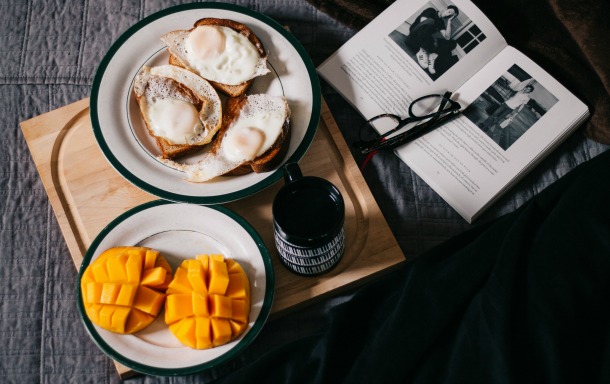If you’re looking for ways to increase deep sleep, bedroom setting matters. Designing your bedroom in a way that helps you stay asleep is essential.
In addition, ensuring you avoid potential sleep disturbers, like excessive light, noise, and caffeine, is a must.

If you’re wondering how to increase deep sleep, start with these 7 tips:
1. Choose a Comfortable Mattress
A high-quality mattress can be one of the most effective ways to increase deep sleep. An old or unsupportive mattress can cause joint pain due to its lack of support.
On top of that, old mattresses can sometimes trigger allergies due to buildup of dust mites over time, preventing proper sleep.
Choose a mattress that provides the level of support your body needs, and make sure it’s large enough to sleep in comfortably. If you sleep better stretched out, upgrading to a king-sized mattress may be enough to help improve your overall sleep quality.
There are a variety of different mattress materials, thicknesses, and support levels available, so make sure you check out mattress reviews before buying one.
2. Upgrade Your Bedding
Next to the mattress itself, bedding is one of the most important considerations when you’re wondering how to increase deep sleep.
Start by ensuring your pillow has the right amount of loft and firmness for you to sleep comfortably. Some people sleep better with a firm pillow, while others prefer something softer.
To support your lower body, especially if you tend to wake up stiff and sore in the mornings, consider adding a lumbar pillow to your bed. Using it to support your lower body may be the solution you need.
Finally, consider adding a weighted blanket to your bed. Weighted blankets have been shown to increase production of serotonin and melatonin, reduce stress, and provide additional comfort when sleeping.
3. Avoid Light
Artificial light is an essential in our lives in many ways, but it can also be incredibly disruptive to a sleep routine.
Excessive light stops the body’s production of melatonin, the hormone that signals the body that it’s time for bed. Blue light, emitted by cell phones and tablets, is especially known for this.
Ideally, you’ll want to turn off any light-emitting devices at least an hour before you go to bed. Once you’re actually ready to get to sleep, make sure there are no lights in the room at all.
If you live in a brightly-lit urban area, consider light-blocking curtains to ensure your room stays dark. Blocking outside light will help you fall asleep quicker at night, and stay asleep longer in the early hours of the morning.

4. Block Out the Noise
Noise from outside your bedroom can be one of the biggest disrupters to deep sleep, whether it comes from another room in the house or out in the street.
Consider using earplugs to block out any noise that might disrupt your sleep. Alternatively, a white noise machine can help minimize other noises while also soothing you to sleep more quickly.
If you’re not sure you want to invest in a white noise machine right away, consider downloading a white noise app on your phone and seeing if it improves your sleep quality.
If you find you’re sleeping better, then you’ll know purchasing a white noise machine is likely worth the cost.
5. Add Some Indoor Plants
Air quality can make a big difference when it comes to ways to increase deep sleep. In fact, a recent study found that people in areas with high air pollution were 60% more likely to have poor sleep quality.
An air purifier is one potential solution, and definitely worth considering if you live in a more highly polluted area.
Otherwise, adding plants to your space is a beautiful and cost-effective way to improve your bedroom’s air quality.
There are a variety of indoor plants you could add to a bedroom that are hardy and easy to care for, including snake plants, pothos, and peace lilies.
And, best of all, adding a couple of plants to your space won’t just improve air quality. It will also give your room a natural outdoor feel that will help you feel relaxed and at peace every single night.

6. Avoid Caffeine Late in the Day
Caffeine may help give you a boost in the morning, but drinking it too late in the day may just be preventing you from getting the sleep you need.
Even after the initial boost from that cup of coffee has worn off, caffeine continues to affect your nervous system for about 8 hours.
Ideally, try to avoid caffeine entirely after 3pm or so to ensure a proper night’s sleep. If you still find that you struggle to fall asleep, move your caffeine cutoff up by an hour.
Eventually, you’ll find the point at which caffeine has an impact on your sleep, so that you can avoid it after that point.
7. Try To Avoid Napping
For the best possible night’s sleep, avoiding napping can make a big difference. Sleeping for too long during the day throws off your internal clock and could leave you sitting up for hours come nighttime.
A short nap may not have a big impact on your sleep routine, but try to make sure you’re not napping too late in the day. Even a quick nap too close to your regular bedtime may prevent you from falling asleep when the time comes.
Of course, sometimes a job or schedule requires napping during the day. If that’s the case, just make sure to stick to a routine so your body knows when to expect sleep.

A dark, cozy, cool, relaxing, and distraction-free environment is the best scenario to increase deep sleep. If you’re not sure where to start, make changes one at a time so that you can see which ones make a difference.
Listen to your body to discover what works best for you. Everyone has different sleep preferences and needs, so pay attention to how your body reacts when you make a change.
Most importantly, remember that a regular routine is the best way to get a good night’s sleep! Set a regular bedtime and wake-up time and stick to it.
With a few small changes and a proper schedule, you’ll soon be waking up feeling great every morning!
